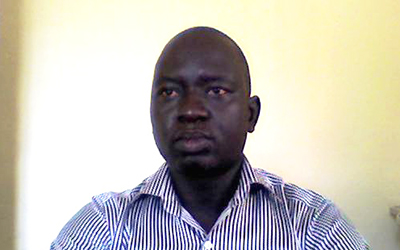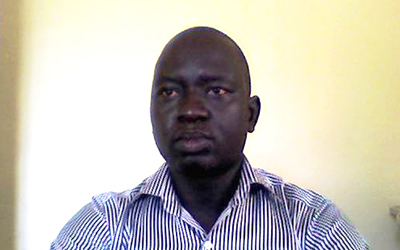Police arbitrarily arrested Michael Koma, the managing editor of South Sudan’s daily Juba Monitor, on May 2 and detained him for four days following the publication of an article critical of the deputy security minister. A veteran journalist, Koma has experienced firsthand the poor state of press freedom within Africa’s newest country. CPJ spoke with him briefly this week.

Tom Rhodes: The police recently detained you for publishing a statement that implicated the deputy interior minister in the killing of a traffic officer. Were any charges presented? Could you provide more detail on what exactly happened?
Michael Koma: Yes, I was detained. I spent four days in police custody without charge and was released on bail pending a final investigation into the case involving the deputy minister. The article we published by members of the Nuer ethnic community in Unity State alleges that the deputy minister is a prime suspect in the killing of a traffic officer named Banjioth Mathoat. The body of the officer was found near the minister’s house and traces of blood were found inside his fence. [Editor’s Note: The minister has denied the allegations.]
TR: A month earlier, in April, national security summoned you and Chief Editor Alfred Taban twice after the Juba Monitor published another statement. Could you tell me more about the statement that caused such consternation and what sort of questions you had to face?
MK: When they summoned us to the national security in April, they objected to the story we published about Yau Yau [Editor’s Note: The Yau Yau are a rebel group led by David YauYau that has fought the ruling party in Jonglei State since April 2010] capturing the Marau airstrip in Jonglei from the government. They said it amounted to supporting the Yau Yau rebellion, simply for publishing their statement, and they alleged that this is treason against the state.
TR: It would appear that there is growing intolerance toward individuals and groups critical of the government, including the media–would you agree with that sentiment?
MK: The situation of the press and the media in South Sudan is very bad. On Monday morning, for instance, some officials of the national security service at the Juba Airport detained all the copies of the Juba Monitor until 2 p.m. after the intervention of the Ministry of Information. Authorities in Juba appear to be targeting our paper more and more without basis. The confiscation of the copies has incurred us a lot of financial losses.
The government officials do not tolerate “negative press”–as they called it. They don’t give specific reasons for harassing the media, but any press that does not praise the government’s assumedly positive reputation is shunned. I am expecting dark days ahead.
TR: Certain topics appear to be “no-go” areas for the press including reporting on insecurity, corruption, and inter-ethnic rivalry. Is this an accurate observation? And how has the Juba Monitor managed to cover these topics?
MK: The authorities are getting increasingly nervous amid growing public unpopularity and increasing intolerance over views and opinions being expressed by the Juba Monitor. They don’t like content that is critical of government conduct. The issues that are touchy to them are talking about corruption, incompetency of government institutions, power struggles between the president and his deputy, etc. We have not resorted to grave self-censorship yet, but it is likely.
TR: What about the status of the media bills? The Media Authority Bill, which was passed on Tuesday, ostensibly sets up an independent regulator, and the two other bills, the Access to Information and Public Broadcaster, will soon be presented in parliament. Do you think their passage would help journalists in terms of security, etc?
MK: Although the media bills will be passed soon, it is doubtful that it will improve the press environment within the country. Rural areas will still be a no-go area for media coverage as well as issues concerning insecurity and corruption. Authorities consider that negative coverage in these areas undermine the state’s authority and image, which national security is keen to protect. Further, especially in the rural areas, authorities do not always adhere to the law–why should the media laws be any different?
